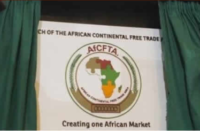Though Nigeria may have signed the African Continental Free Trade Area (AfCFTA) agreement, it may not enjoy the benefits of the deal if three of the major technical challenges that need serious consideration are not addressed, especially as governments negotiate the terms of their participation in the trade deal.
According to researchers at the World Bank, one of the key issues borders in tension between national industrial policies and AfCFTA ambitions.
The researchers noted that the AfCFTA will only succeed if member countries make the regional strategy part of their national policy and proactively address the tensions that arise between the two.
Although the many countries are setting up committees to address some of the issues, the World Bank recommends that countries should find the sweet spot that reinforces national economic goals and ensures maximum gains from increased integration, looking beyond a static assessment of their priorities.
In addition, countries need to make the case to their people as to why integration is useful in the long term – this is particularly important in the larger countries, which may have greater influence on regional decisions.
Similarly, the lack of capacity to monitor and safeguard against illicit practices, including smuggling, dumping, and violation of the rules of origin was identified as a key challenge to be addressed.
Given the African Union’s ambitious industrialization agenda, the World Bank expects to see even more of these types of disputes on rules, particularly the rules of origin, once trade under AfCFTA becomes more widespread.
With this on the horizon, countries need to think through how to address origin fraud, setting clear and simple rules that are monitored and enforced at the national and regional levels.
On trade dispute settlement mechanisms, the researchers noted that one of the key challenges to the AfCFTA that has been identified is the need for an effective dispute resolution mechanism with the authority and institutional capacity to mediate and enforce decisions within and across countries in Africa and with parties outside the continent.
This body should be complementary to the traditional diplomatic/political approach to resolve disputes.
“It’s important to acknowledge that while the rest of the developed world is raising barriers, Africa has resolutely decided to embrace free trade. But ratifying AfCFTA is just the first step on a long journey. Nigeria’s border closing gives us an opportunity to re-evaluate the tools of engagement as Africa moves forward in its decision to create the world’s largest single market”, the researchers note.
Culled: The Guradian



